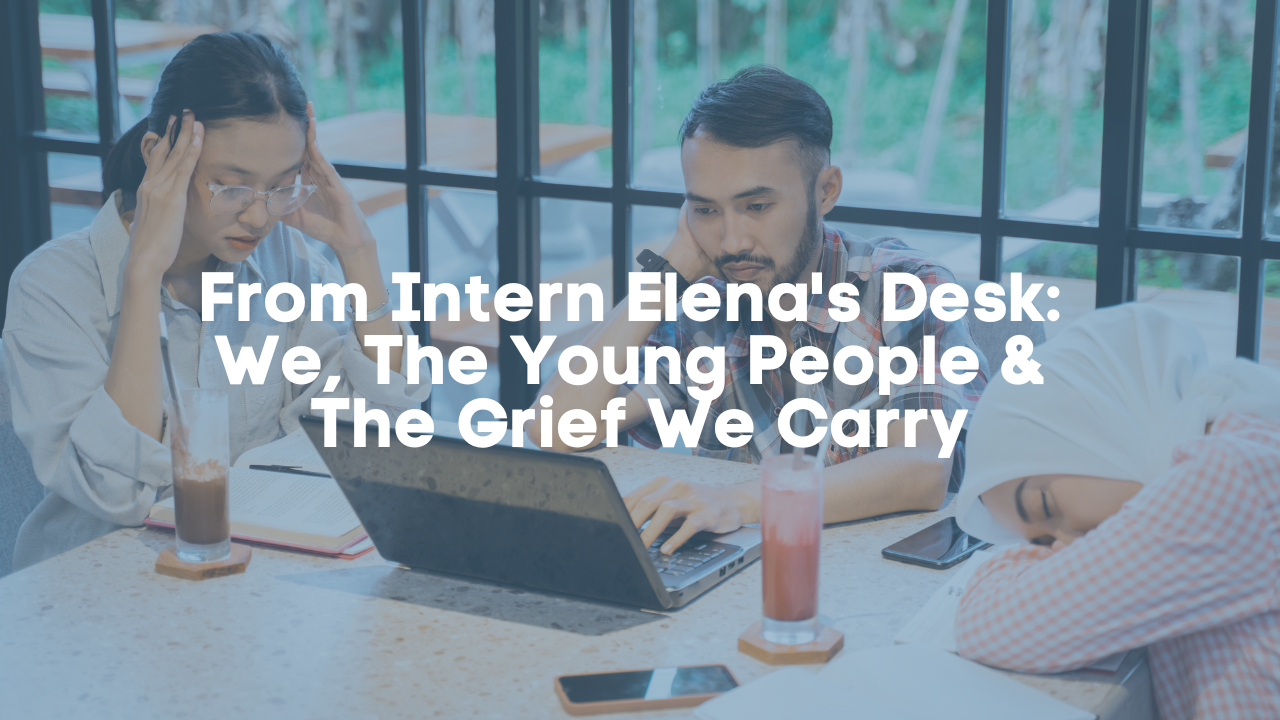From Intern Elena's Desk: We, The Young People & The Grief We Carry
May 04, 2025
"Why would I be grieving?"
That’s the response I got when I asked a classmate (a freshman in college) if he’d ever experienced grief. It was a genuine question, one full of confusion and with the firm belief that grief belongs to funerals and eulogies; not to young people.
But, here’s the truth: we are grieving.
We’re grieving in dorms, at dining halls, while studying at the library, on graduation stages, and in our social media when we scroll through photos and videos of people and futures we thought would always be there. But they’re not; grief is. We just don’t know how to name it.
Grief isn’t just about death or physical loss. It’s the loss of what could have been: the future we once dreamed of, the people you thought would stay forever, and the version of yourself you’ve outgrown.
This kind of grief is significant because it often goes unseen:
-
No one gives their condolences when you lose a friendship.
-
There’s no card for failing a class that tarnished your ‘perfect’ academic record.
-
No one tells you: “I’m sorry for your loss” when you watch the version of yourself you once dreamed of slipping away.
And while society is quick to speak and identify grief as the death of a loved one, the pandemic revealed a broader reality: young people are grieving more than we realize.
Quarantine Grief
When COVID-19 took over the world, it didn’t just take lives, it took away experiences.
Students lost milestones that generations before them took for granted- graduations moved to Zoom, friends drifted apart, and internships or study abroad plans were gone at the drop of a hat. And even now, that grief lingers- while the world has “moved on,” many students still carry the weight of what was taken from them, the lost experiences they can’t get back.
Studies show that nearly 63% of students surveyed in anxiety and depression during the pandemic reported feeling a lingering sense of loss due to disrupted academic and social experiences, even years after returning to campus.
“I missed my middle school graduation. I was ready to close one chapter and start another, and instead of walking across the stage,I had a drive-through graduation. It was over before I could even process it.” – [Irtiqa Khan, NC State University]
Moving Out, at 18
For many students, grief comes not from a singular event, but from growing out of a phase of life and into another. For instance, moving away from home, saying goodbye to childhood rooms, and realizing the chapter of late-night drives with lifelong friends is over.
These transitions are rarely ever labeled as grief, but they are losses just as colossal, filled with the pain and nostalgia of being one person, and then, becoming another.
Losing the ‘Dream’
In college, grief can show up in the loss of ambition, love for a passion, or the death of a ‘dream.’ And I say: ‘dream,’ because as young people we think what we idealize and want in our youth, is ‘it’ or all there is to life. This loss can look like:
-
Not getting into a specific university.
-
Failing a class that you felt was ‘easy.’
-
Realizing that your major no longer excites you.
-
Losing interest in a hobby.
“I was accepted to my dream school, Florida State University, but made the tough choice to go to NC State because I was unable to afford FSU; it was heartbreaking.”– [Maximo Rivera, NC State University]
This is a type of grief anyone can relate to. Yet, it often goes unspoken, masked by platitudes like “It is what it is” or “It just wasn’t meant to be.”
P.S. I’ve written about this before, click here to learn more…
“Are we Breaking up Now?”
“When my best friend and I drifted apart, it was like losing someone who was still alive. I kept seeing her on social media, smiling with new friends, while I was still grieving what we had; wondering why it didn’t last forever.” – [Student, UNC at Chapel Hill]
Romantic breakups are expected in college, but friendship breakups, the quiet, unexpected, gut-wrenching ones are just as bad. Yet, they are almost never acknowledged with the same level of pain and understanding.
When a friend you once saw every day suddenly becomes a stranger, there is no breakup ‘song’ you can listen to or a TV series that can help you get ‘through it.’ It’s a kind of grief without much attention, one without closure.
Call it what you want, or.. Just Call it Grief
The most damaging thing about young grief is how easily it is dismissed by comments like:
-
“You’re still young, you have much more to live.”
- “You’ll make new friends.”
- “You’re too young to be in pain.”
But grief doesn’t wait for an age or time in our lives. It doesn’t check IDs. It shows up at the library, in sports games, and group projects- it creeps into the experiences we lost and takes a form of unspoken goodbyes.
For young people, learning to recognize grief is the first part of moving on- it's okay to mourn the version of college you didn’t get. It’s okay to grieve friendships that faded without warning.It’s okay to carry sadness for the future you once pictured.
And most importantly: it’s okay to call it grief.
SOURCES:
Join the Grieve Leave movement
Share your info to join our Grieve Leave community. You don’t want to miss anything!


